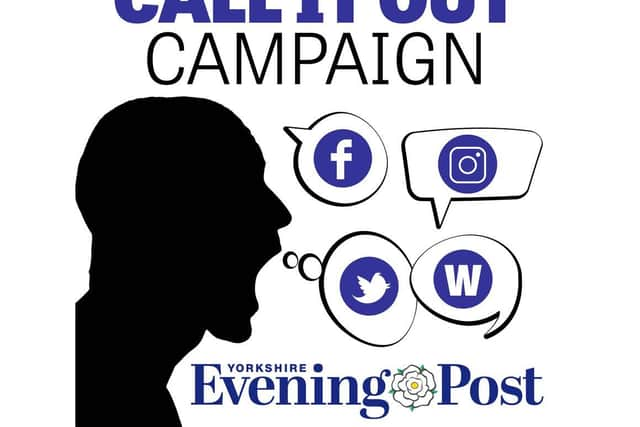How you can support the Call It Out social media campaign
This article contains affiliate links. We may earn a small commission on items purchased through this article, but that does not affect our editorial judgement.
and live on Freeview channel 276
We know there are lots of positives to using social media, from connecting with old friends and finding new communities to sharing your experiences and seeing the world through the eyes of others.
But we know it can also attract people who choose to hurl abuse and make personal attacks when they disagree with someone's views, post hateful comments or target individual users.
Advertisement
Hide AdAdvertisement
Hide AdHere’s how you can help to call out this harmful behaviour by reporting unacceptable comments to the UK’s three most popular social media providers or, where necessary, to the police.


Behaviour not allowed on Facebook includes:
- Posting things that do not follow the Facebook Community Standards, such as threats, hate speech or graphic violence.
- Using Facebook to bully, impersonate or harass anyone.
- Abusing Facebook features in a way that may make others feel uncomfortable or unsafe, such as sending friend requests to many people you do not know.
To report an individual post:
1. Click the three dots in the top right of the post.
2. Click Find support or report post.
3. To give feedback, click the option that best describes how this post goes against the Community Standards. Click Next.
Advertisement
Hide AdAdvertisement
Hide Ad4. Depending on your feedback, you may then be able to submit a report to Facebook. For some types of content, it does not ask you to submit a report - but it does use feedback to help its systems learn. Click Done.
There are also similar mechanisms for reporting comments, images, pages, groups, events and other things that you think are not following the Facebook Community Standards. Click here for more advice on Facebook about how to make reports.
Like Facebook, Instagram has its own set of Community Guidelines setting out what content and behaviour is acceptable. Overstepping these boundaries may result in deleted content, disabled accounts, or other restrictions.
If you have an Instagram account, you can report abuse, spam or anything else that doesn't follow the Community Guidelines from within the app.
To report a post or profile:
1. Tap the three dots above the post.
2. Tap Report.
3. Follow the on-screen instructions.
Advertisement
Hide AdAdvertisement
Hide AdClick here to find out about mechanisms for making reports if you’re using Instagram on the web or want to report comments. You can even make a report if you do not have an Instagram account by using this form.
Twitter says it strives to provide an environment where people can feel free to express themselves but it wants to make it easy for people to report any abuse. Its reporting mechanism allows multiple tweets or lists to be included in the same report, helping it gain better context of the problem.
To report a tweet:
1. Navigate to the tweet you would like to report on twitter.com or the app.
2. Click or tap the downward arrow icon.
3. Select Report.
4. Select It’s abusive or harmful. You will be asked to give more information about the issue and potentially select additional tweets from the account you are reporting.
Advertisement
Hide AdAdvertisement
Hide Ad5. The text of the tweets you reported will be included in follow-up emails and notifications sent to you. To opt-out of receiving this information, uncheck the box next to Updates about this report can show these tweets.
Details of similar mechanisms for reporting an account, list, individual message or conversation, or abusive behaviour are available here.
When might it be a criminal matter?
There are a number of offences linked to abusive behaviour on social media that could warrant the attention of police.
Hate crime is any criminal offence which is perceived by the victim or any other person, to be motivated by hostility or prejudice based on a person's disability, race, religion, sexual orientation or gender identity or perceived disability, race, religion, sexual orientation or gender identity. It includes inciting hatred by words, images or videos.
Advertisement
Hide AdAdvertisement
Hide AdA hate incident is any non-crime incident perceived by the victim or any other person to be motivated by hostility or prejudice based on a person's disability, race, religion, sexual orientation or gender identity or perceived disability, race, religion, sexual orientation or gender identity. Examples include online abuse, insults or harassment.
Reports relating to hate crime or a hate incident can be made by calling police on 101 or completing the form here.
Online bullying or "cyber bullying" is the use of electronic media, especially a mobile phone, tablet or home computer to intimidate, threaten or upset someone. Research suggests that cyber bullying is most common among teenagers - with at least one in five having been a victim. It should be reported to the police on 101 or online here.
Stalking and harassment can take place online and can be extremely traumatic for victims. Reports can be made to a social media provider, but you can also call the National Stalking helpline on 0808 802 0300 or police on 101.
A message from the Editor:
Advertisement
Hide AdAdvertisement
Hide AdLeeds has a fantastic story to tell - and the Yorkshire Evening Post has been rooted firmly at the heart of telling the stories of our city since 1890. We believe in ourselves and hope you believe in us too.
Subscribe to our website and enjoy unlimited access to local news and information online and via our app. With a digital subscription, you can read more than five articles, see fewer ads, enjoy faster load times, and get access to exclusive newsletters and content. Click here to subscribe.
For more details on our newspaper subscription offers, click here.
Thank you,
Laura Collins